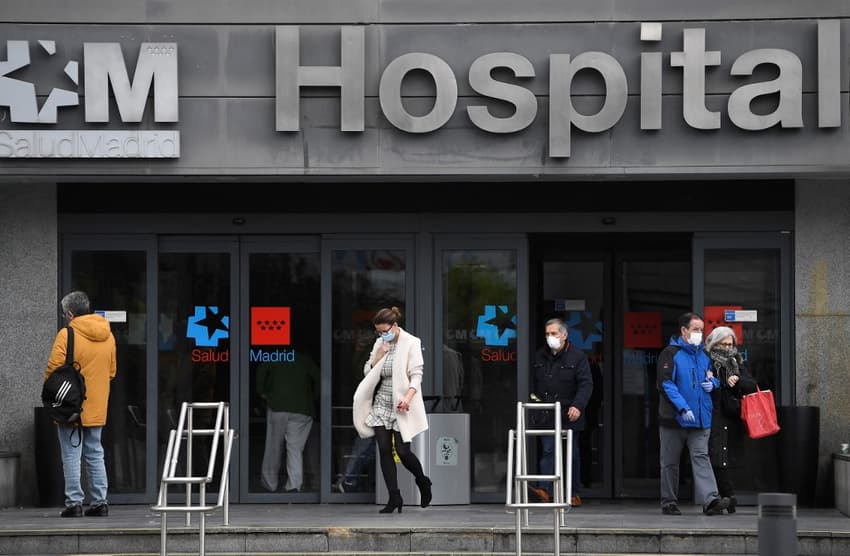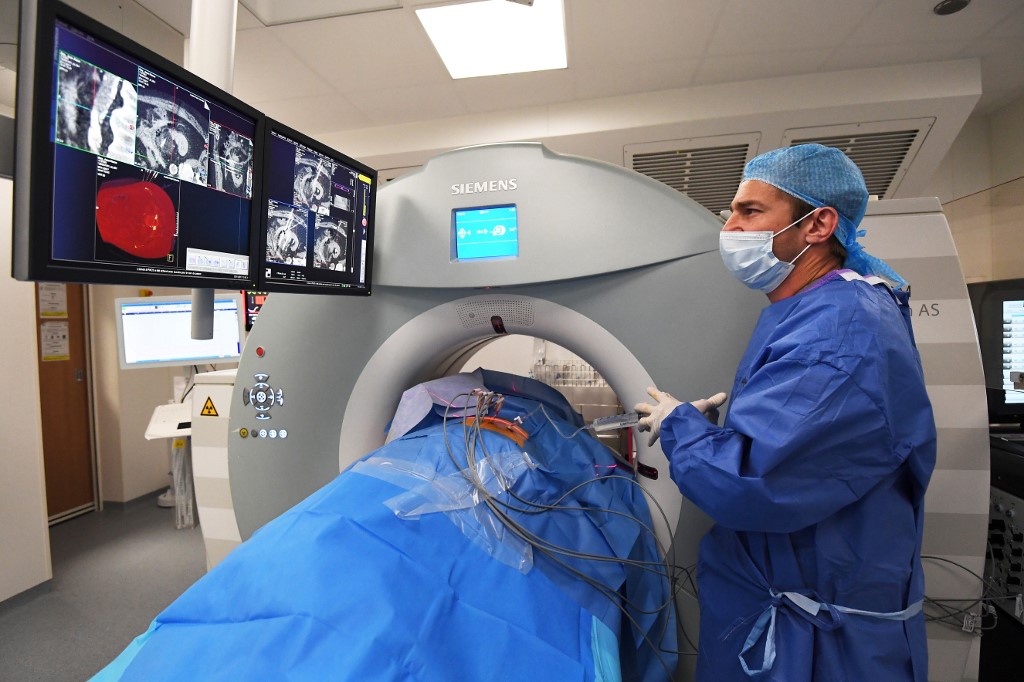BREXIT: How Britons can access Spain's public healthcare if they're not pensioners or working

Many Brits in Spain are anxious about what Brexit means for their access to public healthcare. Luckily there's a scheme which can solve this: the “convenio especial” (special agreement). Here's what you need to know about it.
The question of healthcare weighs heavily on the minds of many Brits in Spain now that the UK is officially out of the EU. What the best healthcare option for them is depends largely on their individual situation.
UK nationals who have a job or are self-employed in Spain get access to Spain's public healthcare through social security contributions, as do British people with a Spanish pension or UK state pensioners who can get treatment at Spain's public hospitals through the S1 form.
READ ALSO: Healthcare in Spain - the steps to apply for the S1 form for UK state pensioners
Then there are Brits who were living in Spain before January 1st 2021 and are now applying for residency, and therefore have to prove they have comprehensive private health coverage equivalent to that offered by Spain’s sanidad pública (public healthcare).
There are also the elderly Britons who were already residents in Spain before Brexit but who might not qualify for the S1 scheme and who pay for an expensive private health insurance policy, especially if they have pre-existing conditions.
And there are countless other scenarios in which Brits in Spain who are out of work or are having to deal with other difficult situations find themselves worrying about whether they’ll be covered by Spain’s healthcare system, especially now that there's a pandemic.
In fact, one of the main problems foreigners in Spain have faced in recent months has been the lack of access to the Covid vaccine as many only have private health policies and only Spain's public healthcare institutions have been inoculating the population. This has for the most part been resolved fortunately, as you can find out by reading the articles just below.
READ ALSO: Region by region - What foreigners in Spain should do to register for the Covid-19 vaccine
Luckily, there is a healthcare agreement in Spain which can resolve the problem of long-term access to Spain's public healthcare if Britons are not working or are not pensioners, or if they don't want to carry on paying private health insurance. It's called the convenio especial.
What is el convenio especial?
This “special agreement” allows Brits and other foreigners who have been registered in Spain for a year to pay a monthly sum into the country’s public health system to have access to it.
This scheme means that those who aren’t working or paying taxes in Spain and those who aren’t using the S1 pension scheme can still use the public health system.
You can apply if you’ve been registered on the ‘padrón’ at your local ayuntamiento (town hall) for at least one year.
Unfortunately, if this isn’t the case you will have to take out private health insurance until you are eligible.
READ MORE: What are the best private health insurance options in Spain for Brits?

What are the costs and benefits of the convenio especial?
Under 65s pay a fixed monthly fee of €60 per month and over 65s pay €157 per month to obtain full cover through Spain’s public health system.
This does represent a big price jump for over 65s (€1,884 a year compared to €720 a year for under 65s) but it is quite possibly the best option out there for those elderly Brits in Spain not covered by S1 and who have pre-existing medical conditions as they will be completely covered.
Although there are private insurance options for seniors that work out cheaper than the convenio especial, they are very unlikely to cover pre-existing medical conditions or will only do so at a much higher rate.
There are also instances in which private health insurance companies scrutinise any medical condition the insured person suffers after taking out the policy under the premise that it may have been pre-existing, whereas with public health cover this won’t happen and the fee will only change once the person turns 65.
Are there situations in which private healthcare in Spain is better?
Spain has been consistently ranked among the world’s best for its standard of public healthcare as well as being a global leader in organ transplants for decades.
But prior to the coronavirus pandemic, patients in many parts of the country were having to wait long periods for appointments and operations, a situation which has worsened as Covid-19 sufferers take up hospital beds and medical staff’s attention.
In 2018, patients in Spain waited an average of 93 days for surgery at a public hospital. One in every eight patients waited for over six months.
As often happens in Spain, there remain big disparities between regions. Whereas in Madrid and La Rioja the average waiting times were 47 days, in the Canary Islands and Catalonia they were 147 and 132 days respectively.
There were also reports that cancer patients were registering in different regions despite not living there in order to get access to the latest life-saving cancer treatments, not evenly distributed across the country.
The biggest advantage of taking out a private healthcare policy in Spain is that waiting times are greatly reduced if medical attention is needed.
It's also worth noting that if you opt out of the "convenio especial" you will not be able to sign up again until a year has passed. The "convenio especial" doesn't entitle you to a Spanish EHIC either.

How do I apply for the convenio especial?
Unfortunately, these inconsistencies between regions may also apply to the availability of the “convenio especial” to its residents.
For example, in 2018 Andalusia’s regional health department got rid of this ‘special agreement’, only to reintroduce it in 2019.
So the first thing you should do is find out at your local health centre if the convenio especial is available in your autonomous community in Spain, and if so what the requirements and documentation are.
These are the general requirements to be able to apply, which may differ according to your region:
1. You can prove that you have been living in Spain continuously for at least one year prior to the application. (If you have lived in different areas of Spain in the last year, this can done be through multiple “certificados de empadronamiento” or “padrón”).
2. You are currently registered/“empadronado” at the town hall of the autonomous community that you are applying from.
3. You do not have access to another health care agreement, bilateral agreement between Spain and your home country or another form of health cover.
4. You are residing legally in Spain.
5. Every member of the family needs to make their own individual application. In some cases, children and pregnant women may be exempt.
These are the documents that are usually needed for the application, which again my differ between regions:
1. Copy of and original Passport/NIE/Residency document
2. Document proving that you have lived continuously in Spain for a period of at least one year- This can include a rental agreement, utility bills etc.
3. “Padrón” certificate from your local town hall, issued recently in order to prove current registration.
4. A filled-out application form (specific to the autonomous community) which includes your personal and contact details, banking information through which direct debit payments can be set up(“domiciliación de pago”).
5. Some regions ask for a “Declaración responsable”to declare that you are not part of or entitled to another bilateral agreement or healthcare scheme. This can usually be downloaded from the regional health department’s website.
Here are some useful links that can help you to find out more about the “convenio especial” in regions of Spain popular with Brits.
Conclusion
If you live in Spain, you don’t work or have a pension and have a pre-existing medical condition, the “convenio especial” is probably the best and most affordable option for you to have full medical cover.
It’s particularly favourable for Brits in this situation who are under the age of 65, and even for those over 65 it may be the only viable option.
If you are in good health, it's worth considering the possibility of becoming self-employed in Spain and contributing to the country's social security system, as this will also give you and your spouse/children access to state healthcare.
READ MORE: Moving to Spain: What's the difference if I move before or after December 31st?
Comments
See Also
The question of healthcare weighs heavily on the minds of many Brits in Spain now that the UK is officially out of the EU. What the best healthcare option for them is depends largely on their individual situation.
UK nationals who have a job or are self-employed in Spain get access to Spain's public healthcare through social security contributions, as do British people with a Spanish pension or UK state pensioners who can get treatment at Spain's public hospitals through the S1 form.
READ ALSO: Healthcare in Spain - the steps to apply for the S1 form for UK state pensioners
Then there are Brits who were living in Spain before January 1st 2021 and are now applying for residency, and therefore have to prove they have comprehensive private health coverage equivalent to that offered by Spain’s sanidad pública (public healthcare).
There are also the elderly Britons who were already residents in Spain before Brexit but who might not qualify for the S1 scheme and who pay for an expensive private health insurance policy, especially if they have pre-existing conditions.
And there are countless other scenarios in which Brits in Spain who are out of work or are having to deal with other difficult situations find themselves worrying about whether they’ll be covered by Spain’s healthcare system, especially now that there's a pandemic.
In fact, one of the main problems foreigners in Spain have faced in recent months has been the lack of access to the Covid vaccine as many only have private health policies and only Spain's public healthcare institutions have been inoculating the population. This has for the most part been resolved fortunately, as you can find out by reading the articles just below.
READ ALSO: Region by region - What foreigners in Spain should do to register for the Covid-19 vaccine
Luckily, there is a healthcare agreement in Spain which can resolve the problem of long-term access to Spain's public healthcare if Britons are not working or are not pensioners, or if they don't want to carry on paying private health insurance. It's called the convenio especial.
What is el convenio especial?
This “special agreement” allows Brits and other foreigners who have been registered in Spain for a year to pay a monthly sum into the country’s public health system to have access to it.
This scheme means that those who aren’t working or paying taxes in Spain and those who aren’t using the S1 pension scheme can still use the public health system.
You can apply if you’ve been registered on the ‘padrón’ at your local ayuntamiento (town hall) for at least one year.
Unfortunately, if this isn’t the case you will have to take out private health insurance until you are eligible.
READ MORE: What are the best private health insurance options in Spain for Brits?

What are the costs and benefits of the convenio especial?
Under 65s pay a fixed monthly fee of €60 per month and over 65s pay €157 per month to obtain full cover through Spain’s public health system.
This does represent a big price jump for over 65s (€1,884 a year compared to €720 a year for under 65s) but it is quite possibly the best option out there for those elderly Brits in Spain not covered by S1 and who have pre-existing medical conditions as they will be completely covered.
Although there are private insurance options for seniors that work out cheaper than the convenio especial, they are very unlikely to cover pre-existing medical conditions or will only do so at a much higher rate.
There are also instances in which private health insurance companies scrutinise any medical condition the insured person suffers after taking out the policy under the premise that it may have been pre-existing, whereas with public health cover this won’t happen and the fee will only change once the person turns 65.
Are there situations in which private healthcare in Spain is better?
Spain has been consistently ranked among the world’s best for its standard of public healthcare as well as being a global leader in organ transplants for decades.
But prior to the coronavirus pandemic, patients in many parts of the country were having to wait long periods for appointments and operations, a situation which has worsened as Covid-19 sufferers take up hospital beds and medical staff’s attention.
In 2018, patients in Spain waited an average of 93 days for surgery at a public hospital. One in every eight patients waited for over six months.
As often happens in Spain, there remain big disparities between regions. Whereas in Madrid and La Rioja the average waiting times were 47 days, in the Canary Islands and Catalonia they were 147 and 132 days respectively.
There were also reports that cancer patients were registering in different regions despite not living there in order to get access to the latest life-saving cancer treatments, not evenly distributed across the country.
The biggest advantage of taking out a private healthcare policy in Spain is that waiting times are greatly reduced if medical attention is needed.
It's also worth noting that if you opt out of the "convenio especial" you will not be able to sign up again until a year has passed. The "convenio especial" doesn't entitle you to a Spanish EHIC either.

How do I apply for the convenio especial?
Unfortunately, these inconsistencies between regions may also apply to the availability of the “convenio especial” to its residents.
For example, in 2018 Andalusia’s regional health department got rid of this ‘special agreement’, only to reintroduce it in 2019.
So the first thing you should do is find out at your local health centre if the convenio especial is available in your autonomous community in Spain, and if so what the requirements and documentation are.
These are the general requirements to be able to apply, which may differ according to your region:
1. You can prove that you have been living in Spain continuously for at least one year prior to the application. (If you have lived in different areas of Spain in the last year, this can done be through multiple “certificados de empadronamiento” or “padrón”).
2. You are currently registered/“empadronado” at the town hall of the autonomous community that you are applying from.
3. You do not have access to another health care agreement, bilateral agreement between Spain and your home country or another form of health cover.
4. You are residing legally in Spain.
5. Every member of the family needs to make their own individual application. In some cases, children and pregnant women may be exempt.
These are the documents that are usually needed for the application, which again my differ between regions:
1. Copy of and original Passport/NIE/Residency document
2. Document proving that you have lived continuously in Spain for a period of at least one year- This can include a rental agreement, utility bills etc.
3. “Padrón” certificate from your local town hall, issued recently in order to prove current registration.
4. A filled-out application form (specific to the autonomous community) which includes your personal and contact details, banking information through which direct debit payments can be set up(“domiciliación de pago”).
5. Some regions ask for a “Declaración responsable”to declare that you are not part of or entitled to another bilateral agreement or healthcare scheme. This can usually be downloaded from the regional health department’s website.
Here are some useful links that can help you to find out more about the “convenio especial” in regions of Spain popular with Brits.
Conclusion
If you live in Spain, you don’t work or have a pension and have a pre-existing medical condition, the “convenio especial” is probably the best and most affordable option for you to have full medical cover.
It’s particularly favourable for Brits in this situation who are under the age of 65, and even for those over 65 it may be the only viable option.
If you are in good health, it's worth considering the possibility of becoming self-employed in Spain and contributing to the country's social security system, as this will also give you and your spouse/children access to state healthcare.
READ MORE: Moving to Spain: What's the difference if I move before or after December 31st?
Join the conversation in our comments section below. Share your own views and experience and if you have a question or suggestion for our journalists then email us at [email protected].
Please keep comments civil, constructive and on topic – and make sure to read our terms of use before getting involved.
Please log in here to leave a comment.